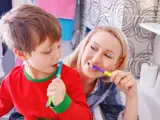- Start early. At 6 months old or as soon as the first tooth sprouts, begin to brush for them in the morning and at night.
- For babies, you can try a silicone brush that fits over your fingertip. This can be more soothing for their teething gums.
- Use about the size of a grain of rice of low-fluoridated toothpaste for children under 2.
- Use a circular motion when brushing.
- “Follow me” - Let children see you brush your own teeth and they can imitate as they watch you. You can also let them try to brush your teeth.
Oral Hygiene
Teaching your little ones to take care of themselves as they grow and learn is often one of the greatest rewards and challenges as a parent. Although good oral hygiene from an early age is important, many children are particularly resistant to brushing their teeth and flossing.
If you are having a hard time getting your child to brush and floss regularly and adequately, you are certainly not alone. It takes a lot of time and consistency.


Good habits at an early age
Establishing good oral hygiene habits from an early age will aid in preventing cavities, disease, and several other health risks.
Included here are some tips for helping your children to develop healthy oral hygiene habits based on their ages. In general, it is important to brush twice a day at every age and to avoid sugary food and drinks.
Be prepared to assist your child with brushing their teeth until they are 8 years old and with flossing until they are 10 years old. From ages 6-12, children lose their baby teeth and their grown-up teeth come in.
This can be a source of both excitement and anxiety, so it is important to keep an open dialogue with your child about their teeth and to build consistent habits throughout this process. Finally, remember to bring your children to the dentist for check-ups every 6-12 months.
Tips to Help Your Kids Brush Their Teeth
Tips to Help Your Kids Floss their Teeth

What About Fluoride?
Fluoride is important for dental health. It helps prevent cavities and hardens tooth enamel to make teeth stronger. However, it is not intended to be swallowed. Use low fluoride toothpaste for small children, encouraging them to spit and rinse after. By age 6, most children are ready for regular fluoride toothpaste.

How Often To Bring Your Child To See Dentist
Regular dentist visits are an important part of maintaining good oral health. You will want to make sure you bring your child in for an exam and cleaning every 6-12 months starting around their first birthday. Regular dentist visits will not only contribute to a well cared-for mouth, but will also improve your child’s level of comfort with the dentist and getting regular checkups. Call Alligator Pediatric Dentistry today to make your child’s next appointment.
